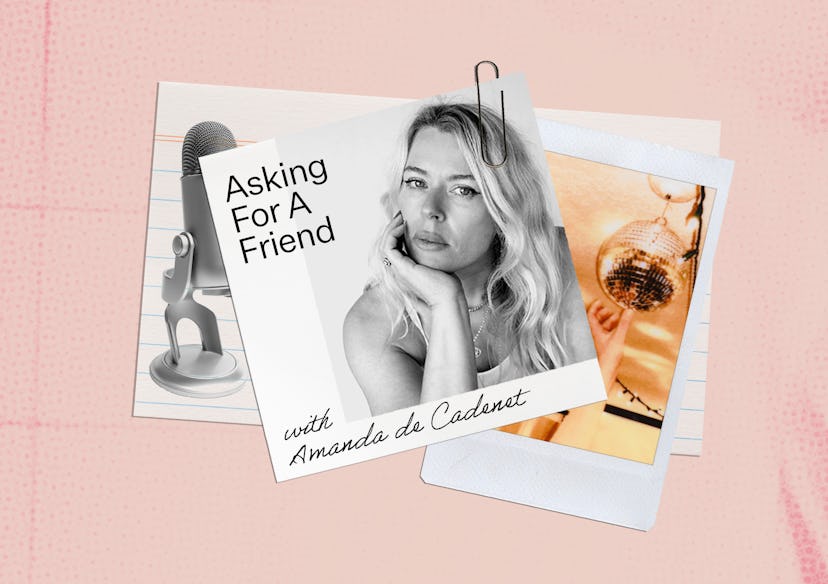Asking For A Friend
My Friends Don’t Understand Why I’ve Stopped Drinking
All my relationships shifted once I became sober.

Q: For more than a decade, I was escaping from a difficult divorce and many other decisions in my life through alcohol. I just wanted to be numb. My daily routine started with alcohol, and then I began escaping through sex, too, finding ways not to feel lonely. But I realized I felt more empty afterward. I decided to become alcohol-free two months ago, and I finally feel grounded and more focused — but as a result of not drinking, all my relationships have changed.
I feel like we need to allow our identities to shift, but I’m starting to feel disconnected from the people around me. My identity used to be related to electronic music, partying, having lovers, and being bold and adventurous. My friends keep saying to me “Oh, no, you’re not like this” or “You’ve got to be kidding” or “You’re coming back.” I haven’t felt this good in years, and I’m very proud, so I’d love to hear more about handling these relationships when newly sober.
A: Julia, I am so pleased you reached out to me about sobriety. It’s a personal choice at what point somebody decides that they need to make changes, and using drugs and alcohol to self-medicate is something that I certainly did for many years. I want you to know that it takes a lot of bravery and courage to face the truth about your relationship and the ways you are checking out of your life.
You mentioned that your friends don’t really understand your new sobriety and are questioning why you made this choice. In the beginning, I also experienced this. My friends said things like “You weren’t that bad; why do you need to be sober?” What I have since learned is that when one person in a group makes a significant change like this, it reflects the rest of the group’s issues. They may try to get you to revert back to your old behavior so they don’t have to face their own possible addictions. It’s important to not listen to what they say. You know way better than anybody else how you feel about yourself and the changes you need to make.
Sobriety is for the people who are willing to take the hard path because they know it’s the best thing for them.
This is easier said than done, but finding a supportive community of new people with whom you can spend time, and who are also invested in their own sobriety, is a great way to keep yourself from feeling lonely. It’ll be good to have alternatives to hanging with your old crew. I was able to keep some of my friends — the ones who understood what I was trying to do. But there were many who I was not able to keep in my life, mostly because our common interest — i.e., drinking and getting high — was no longer there. I found it hard to be around people who were still using and was worried I would feel triggered to use. This may not be the case for you, but there was a period of time when I felt quite lonely. I wanted to be sober, but I didn’t want to lose my lifestyle and friends too. My advice would be to pick one or two people whom you feel the closest to and let them know that just because you are choosing sobriety, you hope that doesn’t preclude you from maintaining your friendship. Be open to hearing what they say. Also, be aware that it’d be best to get rid of anyone who won’t accept your new lifestyle.
I would be dishonest if I said that sobriety is a breeze. It is not. It is for the people who are willing to take the hard path because they know it’s the best thing for them. For me, stopping drinking was just the first step. I have had to address my thinking and who I am as a person on a daily basis ever since I put down the drink and the drugs. It took about a year for me to feel like a new version of myself was appearing — it was someone who I wasn’t familiar with in the early days, and I felt awkward in many situations. I was learning to do basic things all over again as a sober woman — from small stuff like going out for a meal and not drinking wine to much bigger things like having sex sober. That was terrifying at first! This is a normal and necessary part of growth, and everyone goes through it.
Know that there is so much support for you to do this. You don’t have to do it alone. People have stayed sober in many ways. Twelve-step meetings are free and available to anybody who has the desire to stop drinking. (The most common one is Alcoholics Anonymous.) What I love about 12-step recovery is that it’s available to everybody regardless of their financial situation, and with the addition of Zoom meetings, location is not an issue. You get a built-in support system with people who have the common goal of staying sober one day at a time.
It is a personal preference about what could work best for you. Wishing you continued strength and commitment on your journey.
If you or someone you know is seeking help for substance use, call the SAMHSA National Helpline at 1-800-662-HELP(4357).
This article was originally published on